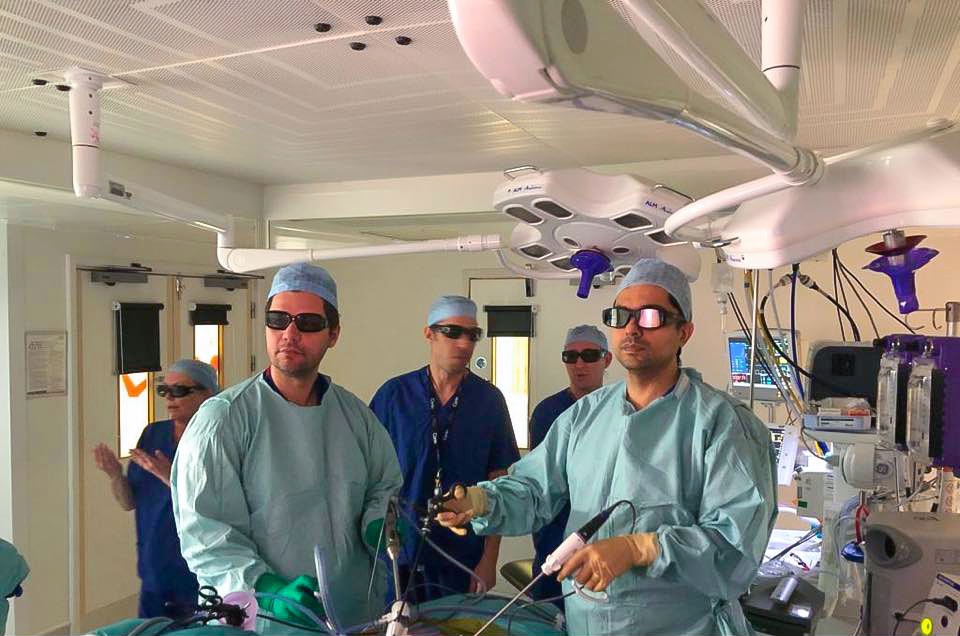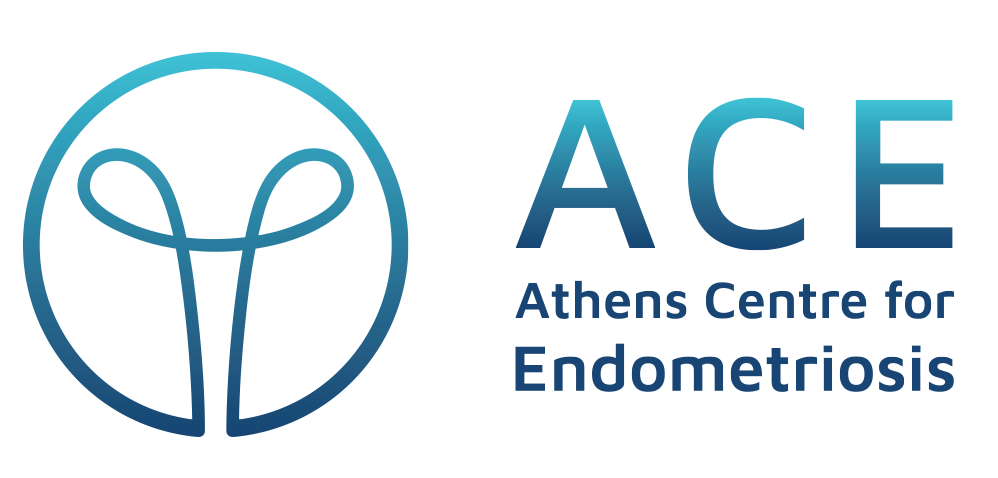Laparoscopy
What is Laparoscpy? | Advantages | Operations | Laparoscopy
Duration | Pain | When can i go home? | Results | Should i pay attention to anything?
What is Laparoscopy?
Laparoscopy (keyhole surgery) belongs to the Minimal Invasive Techniques.During Laparoscopy the surgeon performs 3 or 4 small cuts ranging from 0,5-1 cm.Through the central cut (in the belly button),a camera is inserted into the abdomen and helps the surgeon to inspect and deal with any pathology which lies there.
Laparoscopy can be either diagnostic (when used to identify any pathology) or therapeutic (when used to treat the pathology).Most of the times these two methods are used at the same time.
What kind of operations can be done through keyhole surgery?
Most of the operations in our days can be performed through the laparoscopic route. The most important requirement is that the Gynaecology Surgeon is sufficiently trained on that. Learning to perform laparoscopic surgery takes a lot of time and needs special and absolute dedication.

Dr Kyriakopoulos has worked in the busiest Endometriosis and Laparoscopy Centre in the United Kingdom (CEMIG,Cherstey,UK) as a Fellow of the world known Gynaecology Surgeon and pioneer in Laparoscopy Mr Shaheen Khazali.This Centre is a tertiary referral centre for Endometriosis and other benign gynaecology conditions.
Dr Kyriakopoulos has also worked along with Mr Shaheen Khazali in various private hospitals including «The Lister» Hospital London,the BMI Runnymede Hopsital and the Woking Nuffield Hospital. During his training Dr Kyriakopoulos received the maximum exposure a laparoscopic surgeon can get and also performed complicated and difficult procedures to patients suffering from endometriosis.
How is laparoscopy performed?
Laparoscopy is performed with general anaesthesia. That means that you will sleep and wake up after the procedure is over. In the beginning of the procedure and while you are asleep a small incision of 1 cm will be done in your belly button. Through this incision a fine camera (laparoscope) will be inserted into the abdomen. An additional incision of 0.5 cm will be made at the centre of the bikini line and another one or two incisions (depending on the complexity of the case) will be made on the left and right side of the abdominal wall.
Dr Kyriakopoulos performs Total Laparoscopy Hysterectomy (removal of the womb) using in total 3 incisions instead of the classic method of 4 incisions. In these 3 incisions the incision at the bellybutton is included.
Does Laparoscopy have any advantages when compared to open surgery?
Laparoscopy is a far less invasive kind of surgery compared to open surgery and thus can be better tolerated by the patient.
The advantages of laparoscopy are the following:
- faster recovery
- less time staying in the hospital
- significantly less pain
- faster recovery and return to the daily routine
- less adhesions inside the abdomen
- smaller incisions, better healing, better cosmetic result
- less administration of drugs
How long does it take for a laparoscopic procedure to be over?
The operation usually lasts 45-60 mins in case of a diagnostic laparoscopy. In case of an operative laparoscopy the duration of the operation can range from an hour up to 2 or 3 hours depending on the case. When the procedure is over the patient is transferred to the recovery room and stays there until she fully recovers from the anaesthesia and after that she is taken to her room.
Will i feel a lot of pain after the procedure?
Dr Kyriakopoulos always administers local anaesthetic around the incisions. In more complex procedures he applies a laparoscopic tap-block around the nerve fibres situated in the anterior abdominal wall which significantly reduces the post-operative pain.
This is a new revolutionary method which is used successfully in the Centre of Minimal Invasive Gynaecology (CEMIG,Uk) in which Dr Kyriakopoulos works.
In this way (and in combination with the analgesic medication administered post operatively) the pain is significantly reduced.
When can i go home?
Your discharge from hospital will be in the same day or next morning depending on the case. It would be wise to have someone to escort you in case you feel slightly unwell.
What will happen after laparoscopy?
Dr Kyriakopoulos will have an extensive conversation with you to discuss the intra-operative findings and answer any questions you may have. Any tissue that has been removed during the operation will be sent to pathology. The histology report usually comes back after 2 to 3 weeks. When these results are ready Dr Kyriakopoulos will contact you so that you discuss the findings.
Should i pay attention to anything after i leave from the hospital?
It’s possible that you notice a small amount of blood from your vagina for the first 24 to 48 hours after the operation.
it’s highly likely that you will experience slight discomfort or cramps on the lower part of the abdomen. This might continue for some days after the operation.
Α very common event after laparoscopic procedures is a mild discomfort on your right shoulder. This happens because the gas which is used to inflate your tammy irritates a nerve called phrenic nerve which passes around the right shoulder.
- Rest: usually after surgical procedures patients feel weak and tired. This is absolutely normal due to the fact that the body is uses most of the energy to heal itself. It would be good to take as much rest as you like.
- Return to daily routine: full return to daily routine varies from patient to patient. Usually it takes from a few days up to 2 weeks. The patient should try to return to her daily routine as soon as possible even though this means that she might experience a mild discomfort.Returning to daily routine not only distracts the patient from physical discomfort but also is a very effective way to keep the blood flowing which in turn helps in faster healing.
- Hygiene: at the day of the operation it would be very beneficial to get out of your bed and have a shower.It would be also wise to have someone with you.
A general rule is that after laparoscopic surgery we are allowed to do whatever we can do,without any particular restrictions.It is very wise to «listen» to our body and act accordingly.
